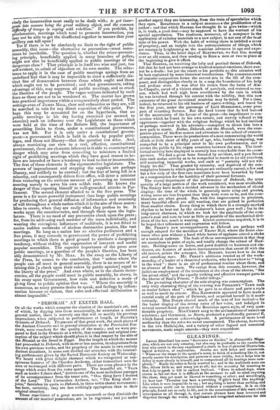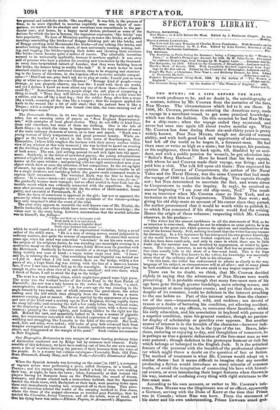GLEANINQS.
Leman Blanchard has some "Sentences on Similes," in Ainsworth's Maga- zine, which are not only amusing, but also may be profitable to the numberless host who resort to the easy expedient of a simile in lieu of pictorial illustration, logical definition, or explanation. Similes are both helps and ornaments. " Whatever the image in the speaker's mind, to think of something like it, not merely assists his description, and presents it more vividly, but it helps him to define it more clearly to himself, and to comprehend all its bearings more com- pletely." Simile therefore is freely resorted to ; and in the multitude some are like, others little so, and many not at all; but the necessity for resorting to that help to speak is felt in earliest boyhood. "Even in school-days. when events so fall out that it is difficult at the moment to call to mind anything like them, they yet must be likened to something or other; and accordingly, we hear how Thwaites has been a-punching Wiglin's head like an) thing: Like what, it were impossible to say ; but anything is better than nothiug, and the sentence could not be terminated without a comparison. It is on this principle, found out so early in life, and in the consciousness of this want which accompanies us all through it, that certain phrases have been invented and dispersed through the world, as legitimate wad recognized substitutes for this t oo general and indefinite simile, 'like anything.' It was felt, in the process of same, to be more dignified to mention explicitly some one object of com- parison, no matter for its absolute and notorious non-resemblance in the par- ticular case; and hence, by a happy social fiction, profound as some of the fictions for which the law is famous,. the ingenious expression 'like bricks' rose into popularity. To hear of Ministers putting on taxes like bricks, or of public meetings assembling like bricks—of Snaggs drinking pale ale like bricks, and of Braggs smoking mild Havannahs like bricks—of one talking like bricks, and another bolting like bricks—in short, of men universally reading, writing, toil- ing, and begging, like bricks—paying their debts and cheating their creditors like bricks—soon became quite a matter of course. The admirable invention seemed to be universally applicable, because it nowhere applied : it was even said of persons who have a passion for erecting new tenements by the thousand, in every lime-besprinkled suburb of London, that they were building homes like bricks, the houses being in reality like lath." It is much better to have standard similes set up by universal consent, than to be stopping and stammer log in the hurry of discourse, in the hopeless effort to devise suitable compari sons—" 'Don't ask me, pray don't ask me to play at cards : I could just as soon play at whist as—just—as the—a--Thames.' 'Strange kind of people—very strange, as you properly observe, my dear Sir : I staid with them six weeks, and yet I declare I know no more about any one of them than—than—than I could fly.'" Sometimes, however, people adopt the safe plan of comparing a thing to itself. "Thus they will inform you, that a terrier in a rabid state bit a soldier, and ran off like a mad dog ; that the soldier flung after him a stone Eke a brick, swearing all the time like a trooper ; that the surgeon applied his knife to the wound like a bit of cold steel; that the patient bore it like a Trojan ; while a certain pretty lass leaned over him, the tears running out of her eyes like—water."
The Democratic Review, in its two last numbers, for September and Oc- tober, has an amusing series of papers on "New England Supernatural- ism," with examples of local ghost-stories. They do not differ in kind from those told elsewhere, but some of them are striking. One is the tale of Ruth Skye; in which the vision is impressive from the very absence of some of the more ordinary elements of terror, as to time and aspect. "Ruth was a young woman of lively temperament and great personal beauty. While en- gaged as the teacher of a school in the little town of Southampton, New Hampshire, (whose hills roughen the horizon with their snowy outline within view of my window at this very moment) she was invited to spend an evening at the dwelling of one of her young associates. Several persons were present, of' both sexes. The sun, just setting, poured its soft rich light into the apart- ment. Suddenly, in the midst of unwonted gayety, the young schoolmistress uttered a frightful shriek, and was seen gazing with a countenance of intensest horror at the open window ; and pointing with her rigid outstretched arm at an object which drew at once the attention of her companions. In the strong light of sunset, lay upon the sill of the open casement, a dead infant—visible to all for a single moment, and vanishing before the gazers could command words to express their amazement. The wretched Ruth was the first to break the silence. 'It is misc.—MINE—My CHILD!' she shrieked ; 'he has come for me ! ' She gradually became more tranquil; but no effort availed to draw from her the terrible secret which was evidently connected with the apparition. She was -soon after arrested, and brought to trial for the crime of child-murder, found guilty, and executed at Portsmouth, N. H."
Here the force of conscience is apparent in the girl; but not so apparent the recess by which the companions were made partakers of the vision—perhaps thq only imagined it after the event of the trial.
The next story appears to resemble the well-known case of Mr. Nicolai, the 'Berlin bookseller, and others which have come within our own knowledge ; the vision-seer in the story being, however, unconscious that the morbid delusion was in himself; the feeling- " Like one that on a lonesome read
Doth walk in fear and dread.
For well he knows a frightful fiend
'huh close behind him tread "—
which he would regard as a proof of the supernatural visitation, being a proof rather of the sickly state. "He is a man of strong nerves, sound judgment in 'ordinary matters, and quite the reverse of superstitious. Restates that several peers ago, when his mind was somewhat 'exercised,' to use his own words, on the subject of his religious duties, he was standing one moonlight evening in a -meditative mood on the bridge which crosses Little River near its junction with the Merrimack. Soddenly he became sensible of a strange feeling, as if some- thing terrible was near at hand ; a vague terror crept over him. 'I knew,' said he, in relating the story, that something bad and frightful was behind me felt it. And when I did look round, there on the bridge, within a few paces of me, a huge black dog was sitting, with the face of a man—a human face, Waver I saw one turned full up to the moonlight. It remained just long enough to give me a one, view of it, and then vanished ; and ever since, when I think of Satan, I call to mind the dog on the bridge?'
The next is a very striking vision, which might have graced some high poem. The scene was the verdant border of the Great Pond in the East Parish of Haverhill; the seer was a lady known to the writer in the Review, "a staid, unimaginative church-member." "A few years ago she was standing in the angle formed by two roads, one of which traverses the pond-shore, the other leading over the hill which rises abruptly from the water. It was a warm -summer evening, just at sunset. She was startled by the appearance of a horse and cart of the kind used a century ago in New England, driving rapidly down the steep and crossing the wall a few yarils before her, without noise, or the displacing of a stone. The driver sat stern erect, with a fierce coon- tenance• grasping the reins tightly, and looking.iieither to the right nor the
left. Behind the cart, and apparently lashed to it, was a woman of gigantic
-size, her countenance convulsed with a blended expression of rage and agony, 'writhing and struggling, like Laocoon in the folds of the serpent. Her head, neck, feet, and arms, were naked ; wild locks of gray hair streamed back from temples corrugated and darkened. The horrible cavalcade swept by across the street, and disappeared at the margin of the pond." Such visions are common in New England.
Our Biocjraphia Britanniea is very meagre of names bearing prefatory titles of distinction conferred not by Kings but by common tacit consent. Fully sensible of this deficiency, we have been making out of late, for our own amuse merit, a list of worthies deriving the patents of their honours from the voice of the people. It is a scanty but curious catalogue—Venerable Bede, Old Parr, Beau Brummell, Bloody Mary, and Beau Nash.—Jerrokra Illuminated Maga-
• zine.
When the Spanish Armada was hovering on the coast [in 1587], a company of vagrant actors were performing a piece, called Sampson, in a booth, at Penryn ; and the enemy, having silently landed a body of men, were making their way, at night, lo burn the town ; when, fortunately at that instant the players having let Sampson loose on the Philistines the sound of drum.,tzumpets, and shouts created such a tremendous hubbub, that the Spaniards fancied the whole town, with Beelzebub at their back, were pouring down upon them and, immediately turning tail, scampered off to their ships. This anec- dote will doubtless remind the reader of the amusing incident in Tom Jones, where the drum of the puppet-showman so terrified poor Partridge that be folded the Chevalier, Jenny Cameron, and all the rebels, were at hand, and 'that his dying hour was come.—Eltiston Papers, in Ainsworth's Magazine,

























 Previous page
Previous page